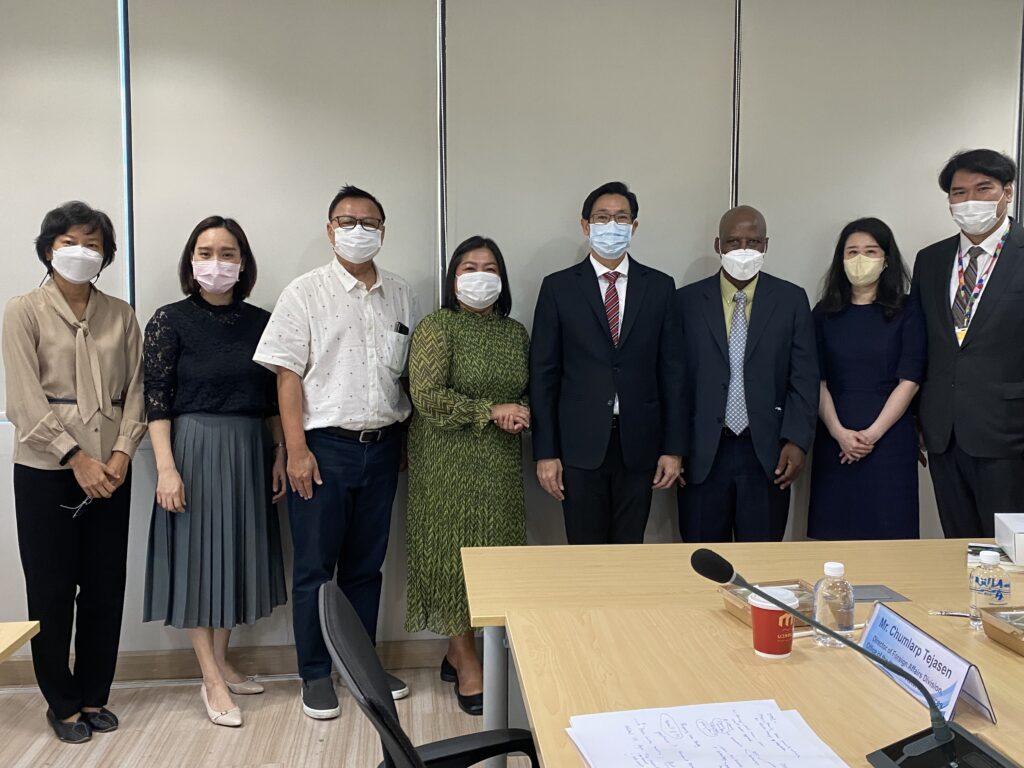Addressing the pressing need to assist socioeconomic aspects of riparian communities, including the monitoring of sea level and water quality that directly affects fish cultivation and farming – Exploring Thailand’s role in P-LINK

P-LINK is a project entitled, “Triangular Cooperation on Sustainable Development in the Lower Mekong Basin based on the Water-Energy-Food (WEF) Nexus”, also known as the RoK-UNOSSC Facility (Phase 3).
25 May 2022: The United Nations Office for South-South Cooperation (UNOSSC) Regional Office for Asia and the Pacific and the Thailand National Mekong Committee Secretariat (TNMCS) held a meeting to discuss the role of the Royal Government of Thailand in the P-LINK project. Thailand is one of the four Lower Mekong Basin countries participating in the project funded by the Ministry of Science and ICT (MSIT) of the Republic of Korea. The three other countries are Cambodia, Lao PDR and Viet Nam.
As an upper-middle income country, Thailand’s role in the project could be both as a beneficiary and a provider within the triangular cooperation arrangement. The purpose of the meeting was to discuss the way forward in lieu of the upcoming First Consultative Stakeholder Meeting to take place on 28 June 2022. The meeting with TNMCS followed the guidance of the Project Steering Committee for the Project Management to clarify Thailand’s position and to report back to the Steering Committee.
The TNMCS delegation, led by Mr. Chumlarp Tejasen, Director of the Foreign Affairs Division at the Office of the National Water Resources under the Prime Minister’s Office, informed UNOSSC participants about a project titled, “Strengthening Civil Society Network in Eight Provinces along the Mekong River”. The objective of the project is to support communities whose livelihoods have been disrupted by climate change and adverse development-related impacts, particularly affecting women, youth and people with disabilities. Furthermore, the project shares knowledge on biodiversity management and conservation as well as transfer of technology.
The parties recognized the similarities between Thailand’s initiative and P-LINK. Thus, there was concurrence that Thailand could have a dual role as a knowledge provider and recipient of relevant and appropriate innovative technologies from the Republic of Korea. Towards further defining this role, the UNOSSC team will also conduct dialogue with the other National Mekong Committees in Cambodia, Lao PDR and Viet Nam with a view to facilitate knowledge exchanges among them. Furthermore, relating to the selection of the pilot area in Thailand, the participants concurred that the P-LINK should focus on the same areas as the Thailand project.
The agreed way forward with Thailand will facilitate the selection of pilots in all participating countries, the allocation of resources, identification of beneficiaries and specification of project results indicators. TNMCS restated their support for the project and underlined that they would be supportive regardless of the role envisaged for Thailand. Furthermore, the parties agreed to a field visit to some of the provinces hosting Thailand’s project, the field visit will precede the First Stakeholder Consultative Meeting.

TNMCS and UNOSSC staff after the meeting
About the RoK-UNOSSC Facility Phase 3
The “Triangular Cooperation Project on Sustainable Development in the Lower Mekong River Basin based on the Water-Energy-Food (WEF) Nexus” (2021-2025) aims to strengthen access to water, food and energy for vulnerable communities living in the Lower Mekong Basin (Cambodia, Lao PDR, Thailand, and Viet Nam) through strengthening development approaches and management in these sectors. It will take integrative and multi-sectoral approaches in application of highly demanded technologies on water, energy and food to improve the livelihoods of the people based on South-South and triangular cooperation modalities. The 5-year project is supported by the Ministry of Science and ICT, Republic of Korea, and the UN Office for South-South Cooperation (UNOSSC) leads the project in partnership with other institutions including the Mekong River Commission Secretariat (MRCS), Mekong Institute (MI) and the Science and Technology Policy Institute (STEPI) and will enlist the help of other UN Agencies.
